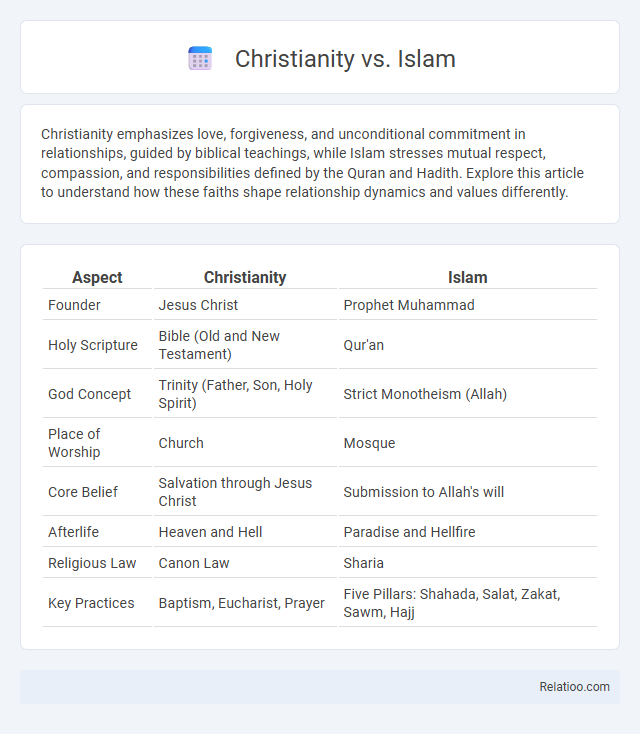Christianity emphasizes love, forgiveness, and unconditional commitment in relationships, guided by biblical teachings, while Islam stresses mutual respect, compassion, and responsibilities defined by the Quran and Hadith. Explore this article to understand how these faiths shape relationship dynamics and values differently.
Table of Comparison
| Aspect | Christianity | Islam |
|---|---|---|
| Founder | Jesus Christ | Prophet Muhammad |
| Holy Scripture | Bible (Old and New Testament) | Qur'an |
| God Concept | Trinity (Father, Son, Holy Spirit) | Strict Monotheism (Allah) |
| Place of Worship | Church | Mosque |
| Core Belief | Salvation through Jesus Christ | Submission to Allah's will |
| Afterlife | Heaven and Hell | Paradise and Hellfire |
| Religious Law | Canon Law | Sharia |
| Key Practices | Baptism, Eucharist, Prayer | Five Pillars: Shahada, Salat, Zakat, Sawm, Hajj |
Overview of Christianity and Islam
Christianity centers on the belief in Jesus Christ as the Son of God and the Savior of humanity, emphasizing salvation through faith and the Bible as its sacred scripture. Islam teaches submission to Allah, with Prophet Muhammad as His final messenger, and follows the Quran as its ultimate guide to faith and practice. Both religions share core beliefs in monotheism, prophecy, and moral accountability, yet differ in theological interpretations and rituals.
Historical Origins and Growth
Christianity originated in the 1st century CE in the Roman province of Judea, rooted in the teachings of Jesus Christ and quickly expanded through missionary work and the Roman Empire's infrastructure. Islam began in the 7th century CE in the Arabian Peninsula, founded by Prophet Muhammad, emphasizing submission to Allah and rapidly spreading across the Middle East, North Africa, and beyond through conquests and trade. Your understanding of these religions' core beliefs highlights the significance of monotheism, scripture, and the role of prophets in shaping two of the world's largest faith traditions with distinct historical trajectories and growth patterns.
Core Beliefs and Doctrines
Christianity centers on the belief in the Trinity, the divinity of Jesus Christ, and salvation through faith and grace, emphasizing the resurrection as a cornerstone doctrine. Islam is founded on the oneness of God (Allah), the prophethood of Muhammad, and adherence to the Five Pillars, with the Quran serving as the ultimate revelation. Your understanding of core beliefs highlights differences in divine nature, salvation, and scripture authority between these two faiths.
Sacred Texts: Bible vs. Quran
The Bible, central to Christianity, is a compilation of Old and New Testament texts considered divinely inspired and guiding believers in faith and practice. The Quran is the holy book in Islam, believed to be the literal word of God as revealed to Prophet Muhammad, serving as the ultimate authority in Muslim life and law. Your understanding of these sacred texts highlights fundamental theological differences between Christianity and Islam, shaping their core beliefs and religious observances.
Concept of God: Trinity vs. Tawhid
The concept of God in Christianity centers on the Trinity, which defines God as one being in three persons: Father, Son, and Holy Spirit, emphasizing a complex unity within the Godhead. In contrast, Islam strongly upholds Tawhid, the absolute oneness and indivisibility of God (Allah), rejecting any division or association of partners with Him. Understanding these core beliefs helps You grasp the fundamental theological differences shaping Christian and Islamic faiths.
Jesus Christ in Christianity and Islam
Christianity centers on Jesus Christ as the Son of God and the Savior, believing in his crucifixion and resurrection for humanity's salvation. Islam regards Jesus (Isa) as a significant prophet, emphasizing his miraculous birth and teachings but denying his divinity and crucifixion, asserting that he was not crucified but raised to heaven. Understanding these distinctions deepens Your insight into the core beliefs that shape both religions' views of Jesus' role in human faith.
Prophets and Messengers
Christianity centers on Jesus Christ as the Son of God and the ultimate messenger who brings salvation through his teachings, death, and resurrection. Islam recognizes Muhammad as the final prophet, with a succession of earlier messengers such as Moses and Jesus, emphasizing strict monotheism and submission to Allah's will. Core beliefs in both religions highlight the importance of prophets as conduits of divine revelation, yet Christianity views Jesus as divine, whereas Islam regards him as a human prophet.
Worship Practices and Rituals
Christianity emphasizes communal worship in churches with sacraments like baptism and communion symbolizing faith and grace. Islam centers around the Five Pillars, including daily prayers (Salah) facing Mecca and fasting during Ramadan as acts of devotion and submission to Allah. Understanding these core rituals helps you appreciate the distinct spiritual frameworks that shape believers' connections with the divine.
Salvation and Afterlife Beliefs
Christianity emphasizes salvation through faith in Jesus Christ as the Son of God, granting eternal life in Heaven or damnation in Hell based on belief and repentance. Islam teaches that salvation is achieved by submission to Allah's will, following the Five Pillars, and righteous deeds, resulting in reward in Jannah (Paradise) or punishment in Jahannam (Hell). Both religions assert a moral accountability after death, but Christianity centers on grace and redemption through Christ, while Islam underscores obedience to divine law and judgment.
Differences and Similarities: Christianity vs. Islam
Christianity centers on the belief in Jesus Christ as the Son of God and the Savior, emphasizing the Holy Trinity, while Islam rejects the Trinity and regards Jesus (Isa) as a prophet rather than divine. Both religions share core beliefs in one God, divine revelation through sacred scriptures--Bible in Christianity and Quran in Islam--and concepts of judgment day, heaven, and hell. Ritual practices differ, with Christianity observing sacraments like baptism and communion, whereas Islam highlights the Five Pillars, including daily prayers (Salah) and fasting during Ramadan.

Infographic: Christianity vs Islam
 relatioo.com
relatioo.com